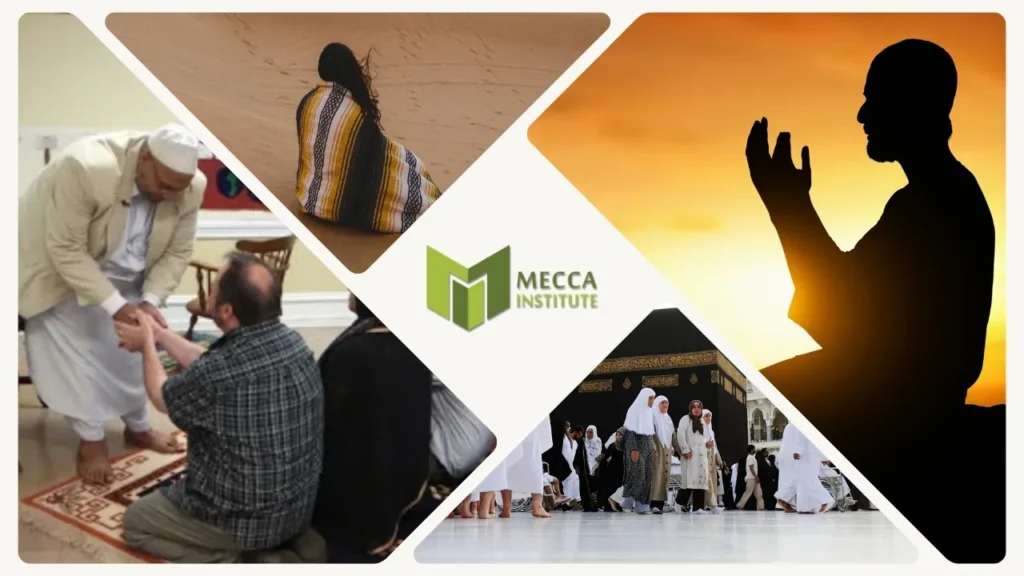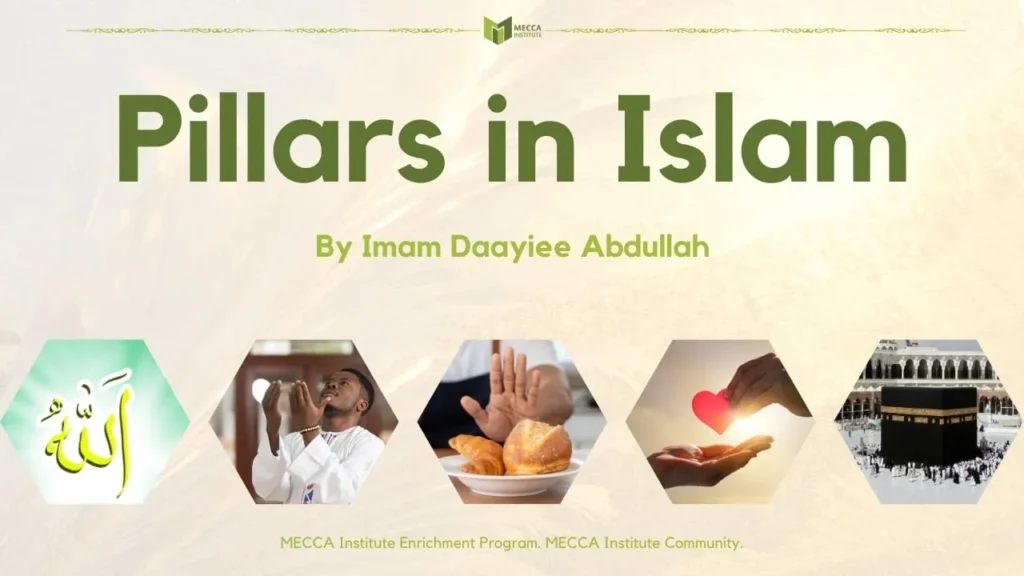In this guide, Imam Daayiee Abdullah discusses the importance of the 5 pillars in Islam, including their meaning in Muslim lives.
The 5 pillars of Islam (“أركان الإسلام” or ‘Arkan ul Islam) metaphorically signify the foundation upon which the faith stands. Each pillar represents a fundamental aspect that is crucial to a Muslim’s way of life. In other words, these are to hold up a person’s life.
What are the five pillars of Islam? The five pillars are the declaration of faith, the obligatory prayers, the prescribed alms tax, the imposed fasting, and the once-in-a-lifetime required pilgrimage.
Because of their Quranic origin, the concept of the five pillars is universally shared by most major denominations, including Sunnism, Shi’ism, and Sufism. While there may be some differences in interpretation or emphasis on certain aspects of these pillars, they are foundational to the lifestyles of Muslims across different schools of thought within Islam.
Like Sufism, Progressive Islam is not rigid in its approach. Progressive Muslims can be of any school of thought so long as they are progressive in their manner of living, including accepting this diversity. As a result, members of the MECCA Institute do not have to follow any of these pillars because we welcome all Muslims, including cultural Muslims.
Let us expand on these pillars.
1. Declaration of Faith
The shahada (الشَّهَادَةُ) is the most basic of these beliefs because this is the affirmation of a Muslim’s creed. The shahada has several parts, depending on the school of thought. For example, Sunnism proposes that there are two parts, while Shi’ism argues there are three.
All Abrahamic people share the first part and proclaims that there is no god but God. In Arabic, this is “La ilaha ila Allah” (لَا إِلَٰهَ إِلَّا ٱللَّٰهُ). For Muslims, the first part comes from verses in the Quran (directly in 37:35 and 47:19), referenced in over fifty times.
“Muhammaddun rasul-ul-lah” (مُحَمَّدٌ رَسُولُ الله), or “And Muhammad is his messenger,” is unique to the Muslim faith. This is what separates a Muslim from a Christian or a Jew. This part of the shahada declares the legitimacy of Prophet Muhammad. The Quran proclaims this directly and indirectly in many places, but it starts with verse 29 of the 48th sura or chapter.
Meanwhile, the “wa’ Aliyyun waliyy-ul-lah” (وَعَلِيٌّ وَلِيُّ ٱللَّٰهِ), or “And Ali is a Guardian of God,” is exclusive to Shia Muslims. Shi’ism argues that the Quran, specifically in 5:55, which they call the verse of “wilaya” or guardians. Although the verse says all good Muslims are guardians, they choose to name Ali as a protest of historical facts, where it was Abu Bakr who inherited the leadership position from Prophet Muhammad.
Finally, Progressive Muslims do not subscribe to particular shahada since we are diverse in our backgrounds. While I’m of the Sunni school, there are prominent Progressive Muslims who are of Shia background.
2. Prayer

In Islam, salah (“صَلَوٰة” or Prayer) is an obligatory prayer that Muslims offer at various times of the day, depending on what type of Muslim you are.
The salah, as a word in connection to this practice, appears in the Quran in nearly 100 instances, including verse 114 of Sura 11. The directive in 11:114 has led to differences of opinion over the centuries.
Sunnis proclaim that this verse tells us to pray five times, with 2 in the first part of the day (morning and early afternoon), 2 in the second part of the day (late afternoon and sunset), and 1 in the evening (after nightfall).
Shi’ism disputes this. Shi’ism says the prayers are to be performed three times per the verse: in the morning, afternoon, and evening. Yet, like Sunnis, Shia Muslims perform five prayers each day.
Sufis, who can be Sunni or Shia or other, perform the salah according to their school of thought, and this is exactly what Progressive Muslims do.
Other differences include how to actually perform the prayers, including what to say, and the difference of opinion, which is rooted in secondary sources such as the Hadith.
3. Almsgiving
In Islam, zakat (“زكاة” or alms tax) is a prescribed giving of a portion of a Muslim’s wealth to those in need, calculated at various percentages in different denominations. In Sunnism, for example, it is 2.5%.
Like the previous pillars, the alms tax is mentioned throughout the Quran, although 2:177 is probably the clearest definition. In this verse, charity and alms tax are differentiated, noting that while charity can be given to a host of people, including family members, alms tax is specifically for paying (to the state or community leaders).
Zakat has roots in social justice and is a way to redistribute wealth to those in need, as well as purify one’s wealth. It is also a way to strengthen bonds of compassion and solidarity within the community.
Once again, this is an area where there is plenty of disagreement, even within the same schools. For example, Hanbali Muslims (Saudi Arabia, for example) do not pay zakat on currencies, whereas other schools of Sunnism require anything above what it would cost to purchase 4.8 grams of gold, the equivalent of $300 in 2024.
In Shi’ism, zakat does not have a percentage associated with it at all, and they only pay zakat on nine specific items, which are gold, silver, camel, cattle, sheep, goat, wheat, barley, dates, and raisins.
Sufi and Progressive Muslims pay according to their schools of thought, and when there isn’t a school of thought association, a person is invited to pay whatever they can.
4. Fasting
Sawm (“صوم” or fasting) is observing imposed fasting during the month of Ramadan. Muslims observe by abstaining from food, drink, and other physical needs from dawn until sunset.
Ramadan is the ninth month of the Islamic Calendar, which is a lunar calendar that has 354 or 355 days over 12 months. As a result, Ramadan falls on different dates of the Gregorian Calendar, used in most Muslim countries as a civil calendar.
In 2020, Ramadan started on April 23, and on April 12 in 2021, and on March 22 in 2021, and so on. Overall, the year is about 11 days shorter.
As with all 5 pillars of Islam, fasting is based on the Quran. The most immediate verse prescribing it is 2:183.
Fasting instills self-discipline, nurtures empathy for the less fortunate, creates spiritual reflection, and is a way to strengthen a deeper connection to God. Many Muslims, especially in the modern age, see it as a physical and mental rejuvenation, too.
Once again, Sunni and Shia Muslims observe Ramadan a little differently. Sunni Muslims break their fast at sunset, while Shia Muslims wait until all light has disappeared from the sky. Depending on the location, it can take 70-140 minutes later for a Shia to break their fast.
Both Sufi and Progressive Muslims follow individual preferences based on schools of thought.
5. Pilgrimage
Hajj (“حَجّ” or pilgrimage)is making a pilgrimage to the holy city of Mecca at least once in a lifetime, if physically and financially able.
Pilgrimage is a way for spiritual purification, strengthening faith, promoting unity among Muslims worldwide, and cultivating equality and humility before God.
Hajj takes place from the first day to the tenth day of Dhu al-Hijja, the twelfth month of the Islamic Calendar. As a result, like Ramadan, it shifts backward for about 11 days each year on the Gregorian Calendar, used by Muslims worldwide as a civil calendar.
Verse 2:197 mandates the hajj, and it also discourages intimate relations, foul language, and arguments during pilgrimage.
There are major differences in how Muslims observe the hajj, depending on the denomination. For example, a Sunni woman needs a “mahram” or guardian to go to Hajj, whereas a Shia woman does not need one.
Another important difference is that a Sunni can only observe proxy hajj, a hajj on behalf of someone, once he has performed it for himself. In Shi’ism, you can perform the hajj for others before you complete your own.
Similarly, a Sunni woman is not allowed to do proxy hajj at all, whereas a Shia woman can perform proxy hajj. However, Sunnis have a loophole where she can pay for someone, typically living in Saudi Arabia, to perform on behalf of whoever she wants to offer the proxy hajj for. This is one of the booming industries around pilgrimage.
Conclusion
The 5 pillars are essential to Muslims. These pillars form the core framework of faith, worship, and practice that guide our daily lives and spiritual growth.
Due to their Quranic roots, the concept of the 5 pillars of islam is widely accepted among major denominations like Sunnism, Shi’ism, and Sufism. Although interpretations vary, these pillars are fundamental to practices in every branch.
In Progressive Islam, we do not concern ourselves with policing people as it relates to their faith, beliefs, and practices. As I previously stated, we welcome Muslims of all backgrounds, including those who come to us on a cultural level.
May Allah continue to guide us all.
Imam Daayiee Abdullah is the Executive Director of MECCA Institute and the author of “Progressive Islam,” a historic book that defines Progressive Islam.


Pingback: Progressive Islam Guide on Muslim Beliefs, Values, and Practices
Pingback: LGBT Muslims Guide from the Perspective of Progressive Islam
Pingback: Islamic Funeral Costs Guide to Help You Prepare for the Worst